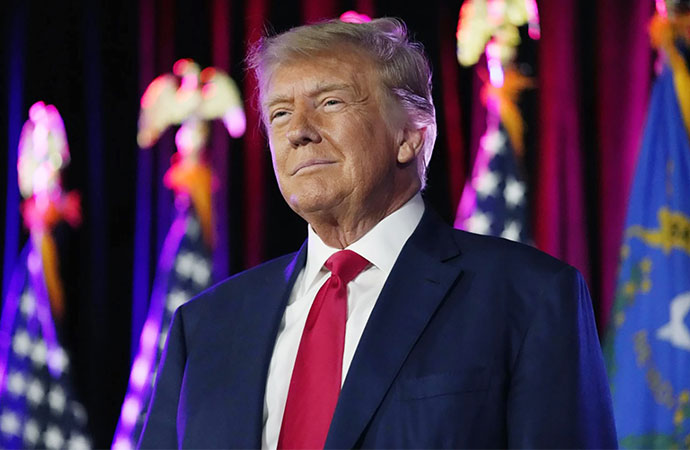Column

US President Donald Trump. Photo: AP/UNB
President Donald Trump's decisions right on taking office give an indication of the role that he will play in world affairs in the next four years. On his first day in office, he signed an executive order directing the United States to quit the World Health Organisation (WHO) because of its handling of the Covid-19 pandemic; and announced that Washington was withdrawing from the Paris climate accord for a second time, in what a news agency called "a defiant rejection of global efforts to combat planetary warming".
China responded forcefully. "China will, as always, support the WHO in fulfilling its responsibilities... and work towards building a shared community of health for humanity," a foreign ministry spokesman said. "The role of the WHO should only be strengthened, not weakened," he added. Commonsensically, the spokesman said: "Climate change is a common challenge faced by all of humanity". China vowed to continue participating in the climate arrangements.
The Chinese official also criticised Mr. Trump's decision to reinstate Cuba on a list of state sponsors of terrorism, merely days after his predecessor Joe Biden had removed the nation from the register. The official said that Mr. Trump's move "fully reveals the hegemonic, high-handed and bullying face of the United States".
While a great deal of media attention is focused on Mr. Trump's moves to deter immigration, deport illegals and make it harder for people to gain citizenship, it has to be said that these decisions lie within the domestic ambit of the extensive powers of the president of the United States. They are purely American issues, and it is Americans, and only they, who should be involved viscerally in debates over the rights and wrongs of those issues. Countries whose citizens are affected by developments in America should ask themselves why their citizens find it so tempting to migrate there. As I said, those decisions lie exclusively within the American political sphere.
Not so the decisions on American membership of the WHO and participation in the Paris accord. These are truly international decisions whose ramifications affect the rest of humanity along with Americans. Therein lies the difference.
What Mr. Trump has done is to signal a degree of American detachment from world affairs that could lead to disengagement if it gains momentum. That would be dangerous for the world, within which the United States exists, because America, for all its faults, remains a global force for good. The WHO's role during Covid certainly came under scrutiny, not least because of the avowed degree of Chinese influence on its pronouncements that absolved China of avowed responsibility for the pandemic's provenance and progress. However, the response to that should have been to keep pursuing the standards of accountability and probity to which to hold the WHO, not to quit it - thereby leaving the organisation even more dependent on Chinese goodwill and support.
The Paris accord is even more telling. Different countries come to its with different agendas that reflect the economic stages of their development and their domestic political imperatives. This is natural. However, at the end of the day, the environment is a globally existential issue; ecology is a universal moral concern. For the United States to take itself out of the race to save the world from itself reflects the terminal stages of the moral fatigue caused by America's ecologically-destructive economic development. What Mr. Trump's decision means is that his country will not have to abide by the decisions reached at climate negotiations. What his decision cannot do is to prevent America from accelerating a race to the bottom in which Americans will suffer along with the rest of humanity. It is as simple as that. Mr. Trump has just burdened the next generation of Americans with an ecological load that they will have to carry along with their global counterparts.
As for Cuba, it boggles the mind to wonder where and what kind of terrorism it is fomenting. Did someone just say "Long live Fidel Castro!" while swinging the American flag in the face of the American police? Gosh! I thought that some good souls had done just that on Capitol Hill four years ago, and have been duly deemed patriotic Americans. Of course, they did not chant in favour of Castro but, even in the unlikely event that they had done so, it would have been considered freedom of speech and not subversion under American law. So, where in America - or elsewhere for that matter - has Cuba been active in spreading its nets of ideological terror? I can understand America's hostility towards Iran because of Iran's hostility towards Israel, but poor Cuba? A young Cuban interviewed for a Brazilian website said: "Wherever necessary, Cuba sends doctors, not bombs..."
What egregiously problematic American decisions will do will be to increase the emotional and political distance between Americans and others in a globalised world. The consequences will show up when the fast-emerging superpower, China, begins to occupy the moral high ground in world affairs and replaces America as a benchmark of the global good.
It will happen if it has to happen. But it does not have to happen.
The writer is Principal Research Fellow of the Cosmos Foundation. He may be reached at epaaropaar@gmail.com

























Leave a Comment
Recent Posts
Pedaling Through the Mangroves ...
The journey from the bustling streets of Barishal to the serene, emera ...
Why the Interim Government mus ...
Two weeks out from what is expected to be a red letter day in the figh ...
Doesn’t matter who thinks what about Bangladesh deci ..
The Other Lenin
US President Donald Trump said his administration
Govt moves to merge BIDA, BEZA, BEPZA, MIDA